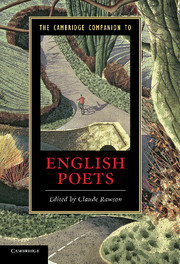Book contents
- Frontmatter
- Introduction
- 1 Geoffrey Chaucer
- 2 Thomas Wyatt
- 3 Edmund Spenser
- 4 William Shakespeare
- 5 John Donne
- 6 Ben Jonson
- 7 George Herbert
- 8 John Milton
- 9 Andrew Marvell
- 10 John Dryden
- 11 Jonathan Swift
- 12 Alexander Pope
- 13 William Blake
- 14 Robert Burns
- 15 William Wordsworth
- 16 Samuel Taylor Coleridge
- 17 George Gordon, Lord Byron
- 18 Percy Bysshe Shelley
- 19 John Keats
- 20 Alfred Lord Tennyson
- 21 Robert Browning
- 22 Emily Brontë
- 23 Christina Rossetti
- 24 Thomas Hardy
- 25 William Butler Yeats
- 26 D. H. Lawrence
- 27 T. S. Eliot
- 28 W. H. Auden
- 29 Philip Larkin
- Further Reading
- Index
27 - T. S. Eliot
Published online by Cambridge University Press: 28 May 2011
- Frontmatter
- Introduction
- 1 Geoffrey Chaucer
- 2 Thomas Wyatt
- 3 Edmund Spenser
- 4 William Shakespeare
- 5 John Donne
- 6 Ben Jonson
- 7 George Herbert
- 8 John Milton
- 9 Andrew Marvell
- 10 John Dryden
- 11 Jonathan Swift
- 12 Alexander Pope
- 13 William Blake
- 14 Robert Burns
- 15 William Wordsworth
- 16 Samuel Taylor Coleridge
- 17 George Gordon, Lord Byron
- 18 Percy Bysshe Shelley
- 19 John Keats
- 20 Alfred Lord Tennyson
- 21 Robert Browning
- 22 Emily Brontë
- 23 Christina Rossetti
- 24 Thomas Hardy
- 25 William Butler Yeats
- 26 D. H. Lawrence
- 27 T. S. Eliot
- 28 W. H. Auden
- 29 Philip Larkin
- Further Reading
- Index
Summary
Two months before his first book of poems appeared, T. S. Eliot published an essay that dismisses as newfangled nonsense the most prominent poetic innovation of his time. ‘Reflections on Vers Libre’, which appeared in the New Statesman in March 1917, was the first piece of literary criticism Eliot published, but in it he already sounds like the aged authority he was to become. Speaking as if from the height of a great poetic achievement, he decrees, ‘There is no escape from metre; there is only mastery.’ Then, showing his own mastery, Eliot brings his argument to an end with an almost audible snap: ‘we conclude that the division between Conservative Verse and vers libre does not exist, for there is only good verse, bad verse, and chaos’. In form and in substance, ‘Reflections on Vers Libre’ sounds more like the final words of a lifetime practitioner of Conservative Verse than the first literary essay of a poet soon to be famous for revolutionizing his craft.
Even as he lays down the law, however, Eliot lets something a little uncanny back into the closed system of his essay. To formulate the relationship between rhythmic variation and metrical order in verse, he chooses what seems an odd and inappropriate metaphor: ‘the ghost of some simple metre should lurk behind the arras in even the “freest” verse; to advance menacingly as we doze, and withdraw as we rouse. Or, freedom is only truly freedom when it appears against the background of an artificial limitation’ (Selected Prose, pp. 34–5). The spatial organization of this metaphor, in which freedom is somehow highlighted by something that it hides, is enough by itself to make the head spin. But even stranger is the apparent reference to Hamlet III. iv, in which Polonius is discovered hiding behind the arras in Queen Gertrude’s chamber. The reference seems strange because Polonius is not a ghost, nor is he respected as a principle of order. He is killed, of course, as a result of Hamlet’s misplaced impetuosity.
- Type
- Chapter
- Information
- The Cambridge Companion to English Poets , pp. 491 - 507Publisher: Cambridge University PressPrint publication year: 2011

